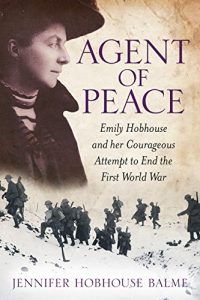In the Anglo-Boer War (1899–1902) Emily Hobhouse championed the cause of the women and children herded into camps by Kitchener’s army. By 1914, a confirmed pacifist, she felt passionately that civilians suffered more than combatants. Throughout the war she was anxious for a negotiated peace. Her ‘Open Christmas Letter’ of January 1915, calling for an end to hostilities, was answered in by 155 prominent pacifist and feminist German and Austrian women.
In 1916 – extraordinarily – she obtained permission to visit German-occupied Belgium and Berlin. A chance meeting with the German Foreign Secretary made her realise that peace negotiations were possible. She put forward a plan to bring about talks, to which he agreed, but in England she was snubbed by the Foreign Office. Despite this setback, Emily continued in her mission to relieve the suffering caused by war, working tirelessly for the release of civilian internees and to secure better food for Belgium
The story of this extraordinary woman and her battle to secure peace is told here largely through her own words, in the form of letter, journal and diary extracts.
In 1916 – extraordinarily – she obtained permission to visit German-occupied Belgium and Berlin. A chance meeting with the German Foreign Secretary made her realise that peace negotiations were possible. She put forward a plan to bring about talks, to which he agreed, but in England she was snubbed by the Foreign Office. Despite this setback, Emily continued in her mission to relieve the suffering caused by war, working tirelessly for the release of civilian internees and to secure better food for Belgium
The story of this extraordinary woman and her battle to secure peace is told here largely through her own words, in the form of letter, journal and diary extracts.






